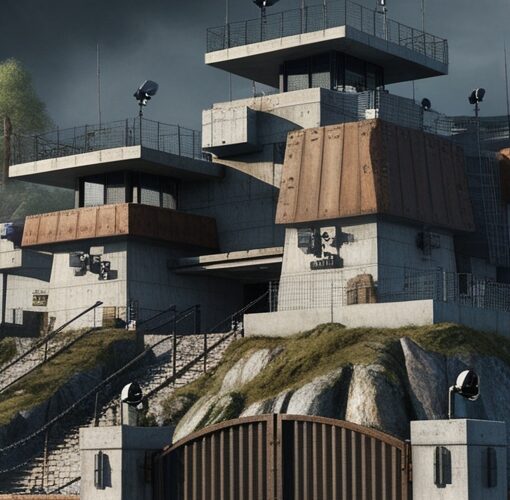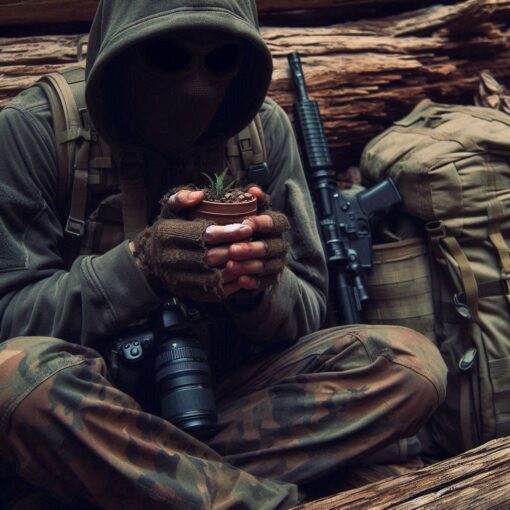Have you ever thought about what it means to truly feel safe in uncertain times? It’s a bit like that feeling when you’re snuggled up in your favorite blanket on a rainy day—warm, secure, and completely at ease.
In the world of survivalism, creating that sense of security for yourself and your loved ones is crucial. Let’s dive into some essential strategies to keep your family safe and your supplies secure!
Understanding the Importance of Security

First things first: why should we even think about survival security? Well, imagine you’re living in a scenario where resources are scarce or emergencies strike without warning. Having a solid plan can mean the difference between comfort and chaos. To be fair, it’s not just about protecting physical items; it’s also about safeguarding peace of mind.
Consider this: if an emergency hits, do you want to spend time worrying about looters or intruders while trying to gather essentials? I didn’t think so! By setting up effective security measures now, you can focus on what really matters—your family’s well-being.
So how do we begin? Start by assessing your current situation. What vulnerabilities exist in your home or community? Think like a detective: identify weak points and consider how someone might exploit them. This proactive mindset will help you build a robust defense plan.
Fortifying Your Home Base

Now that we’ve established the importance of security let’s talk about fortifying your home base—the heart of your operation! Honestly, this is where you’ll likely spend most of your time during an emergency.
Locks and Barriers: Invest in strong locks for doors and windows. Deadbolts are fantastic options for added security. Don’t forget about outdoor barriers too; fences can deter unwanted visitors while giving you peace of mind.
Surveillance Systems: Nowadays, technology makes it easier than ever to keep an eye on things. Consider installing cameras around your property—they don’t have to break the bank! Many systems offer smartphone access so you can monitor from anywhere.
Emergency Plans: Create an emergency plan with everyone in the household. Discuss escape routes, meeting points, and communication methods if separated. Practicing these plans will make everyone feel more prepared—and less anxious—when trouble arises.
And speaking of preparation, remember that being aware of what’s happening around you plays a vital role in staying safe!
Securing Your Supplies
Alrighty then! Now let’s shift gears and focus on securing those precious supplies you’ve worked hard to gather. Whether it’s food storage or medical supplies, protecting these assets is key during challenging times.
Storage Solutions: Use sturdy containers for food storage—think airtight bins or mylar bags—to keep pests out while extending shelf life. Label everything clearly so you know what you’ve got at a glance!
Inventory Management: Keep track of what supplies you have on hand with an inventory system (yes, spreadsheets work wonders!). This way, when it’s time to restock or rotate items nearing expiration dates, you’ll be one step ahead.
Also important is creating redundancy within supply chains; having backup sources ensures you’re never left high and dry if something goes wrong with primary options!
Building Community Connections
Interestingly enough, one often overlooked aspect of survival security is building relationships within your community. After all, there’s strength in numbers! When trouble arises outside our homes (like natural disasters), neighbors can become invaluable allies.
Start by getting involved—attend local meetings or workshops focused on preparedness topics like first aid training or self-defense classes together as a group! Sharing knowledge fosters trust while enhancing everyone’s skills collectively—a win-win situation!
Additionally, establish clear lines of communication among neighbors before any crisis occurs; knowing who has certain skills (like medical expertise) could prove crucial down the line.
Staying Vigilant & Adapting
Finally—a little reminder that vigilance is key when it comes to survival security! As situations change over time—be they personal circumstances or broader societal issues—it’s essential to adapt accordingly.
Regularly review safety measures at home; check locks periodically or update surveillance tech as needed based on new threats identified through research (or good old-fashioned common sense). Flexibility allows us not only to react but proactively prevent potential problems before they arise!
By keeping these principles top-of-mind throughout life’s twists & turns—you’ll create both physical safety AND emotional resilience for yourself & loved ones alike!
Suggested Resources:
Survival Skills You Need
https://www.survivalskills.com
Home Security Tips
https://www.homesecuritytips.com
Community Preparedness Guide
https://www.communitypreparedness.org




